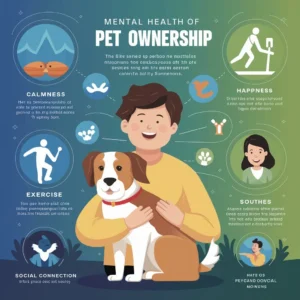Since mental health affects millions of individuals globally, it has become a major topic in today’s culture. The influence of pets on our mental health is sometimes disregarded, even as discussions about emotional well-being become more prevalent. Pets can significantly improve our general quality of life in addition to being adorable companions.
An increasing number of people are turning to their furry pals for support and comfort as stress levels rise and feelings of loneliness become more common in today’s world. Pets are important beyond just being companions, as evidenced by the rising trend of pet ownership. It begs the fascinating question of precisely how these animals help to better our mental wellness.
Come explore the amazing ways that pets improve moods, reduce anxiety, and provide solace during trying times. Find out why having a cherished pet in your life can be one of the best choices you ever make for your health!
The Increasing Pet Ownership Trend
The appeal of owning pets has increased recently. The pleasures and advantages of having a furry friend by their side are becoming more widely acknowledged. This pattern is indicative of a larger cultural movement that values emotional health.
Because of the fast pace of urban living, people frequently feel alone. Pets offer that vital connection. They create a welcoming atmosphere by bringing excitement and warmth into houses.
This increase was largely caused by the pandemic, as many people looked for company during lockdowns. As shelters reported having empty spaces for the first time in years, adoption rates skyrocketed.
This trend is also influenced by social media. Pet influencers share lovely moments with a global audience, encouraging others to adopt or buy dogs.
The number of people owning pets is rising, and with it is awareness of appropriate pet care. People are starting to realize that having a pet requires more than simply enjoyment; it also requires dedication.
The Ways in Which Pets Help Mental Health
Pets have a special power to make us happier. Our mental health might undergo significant transformations as a result of their unwavering love and company.
It instantly cheers you up to return home to a wagging tail or a gentle purr. This kind of small talk may be really comforting at the end of the day.
Pets also promote physical activity. Along with improving your dog’s health, a daily stroll helps you feel less stressed. Walking’s cadence and the fresh air it surrounds can do mental wonders.
Taking care of an animal teaches responsibility and routine. This routine might give you something constructive to concentrate on every day, which can be comforting in stressful times.
Having a pet strengthens one’s bond and helps one fight loneliness. They provide us with unconditional love and emotional support, reassuring us that we are never really alone in the world.
Empirical Data Backing Up the Advantages of Pet Ownership
The significant positive effects pets can have on mental health have been demonstrated by numerous research. Studies reveal that spending time with animals causes the release of oxytocin, also known as the “love hormone.” This substance promotes calm and a sense of connectedness.
According to a University of Missouri study, people who own pets experience less stress than people who don’t. The main stress hormone, cortisol, can be considerably reduced when a furry friend is around.
Additionally, the use of therapy animals in treatment plans for a range of mental health conditions is growing. Research indicates that they can lessen PTSD and anxiety disorder sufferers’ symptoms.
Science supports the notion that the relationship between people and their dogs is more than just companionship. These results demonstrate that having a pet can play a significant role in improving mental health.
Pets of all kinds can offer special advantages for mental health.
Dogs are praised for being devoted friends. Their lively demeanor promotes social interaction and physical exercise. Dogs are ideal for people looking for connection since they can help with feelings of loneliness when you walk or play with them.
A different form of comfort is provided by cats. Their calming purrs and self-reliant demeanor foster a calming atmosphere. One of the best ways to dramatically lower stress levels is to pet a cat.
Even though they take up less room, little animals like hamsters and rabbits can nevertheless bring happiness through companionship. Laughing and taking a break from everyday concerns are provided by observing their fun actions.
Conversely, birds can improve one’s mood with their bright colors and upbeat singing. They strike an ideal balance for some people by encouraging participation without placing undue demands on their attention.
Every kind of pet has unique qualities that meet different emotional requirements and contribute in different ways to overall well-being.
Testimonials and Personal Narratives from Pet Owners
Numerous pet owners recount life-changing events that demonstrate the significant influence animals have on their mental well-being. Sarah’s battle with melancholy was unexpectedly alleviated when she adopted a rescue puppy. Her mood was lifted by the small daily act of taking her pet for walks, which promoted exercise and fresh air.
John tells the story of how, after losing a loved one, his cat provided a consolation. In times of sorrow, the soft nuzzles and soothing purring brought comfort. He was able to reestablish connection by tending to another being.
Then there’s Emily, who says that having a parakeet has greatly decreased her anxiety. Speaking with her feathery friend promoted a sense of routine and helped reduce feelings of loneliness.
These touching tales demonstrate how each human-pet relationship is therapeutic in its own special way. It provides more than simply company—in trying times, it may be an emotional lifeline.
Including Pets in Therapy and Recovery Programs
In mental health practices, the inclusion of dogs in therapy and treatment strategies is becoming more and more popular. Numerous therapists are aware of the significant influence animals can have on emotional recovery.
Pets are brought into sessions by certified practitioners in animal-assisted therapy. This method creates a comfortable environment for clients, enabling them to communicate their emotions more honestly. An animal’s presence helps reduce anxiety and foster trust between the client and the therapist.
Pets are the ideal companions during trying times since they provide unconditional love. Their lively demeanor stimulates motion, which can improve mood and lower stress levels.
Having a pet also instills responsibility and habit. For those who are dealing with depression or other mental health concerns, these components are essential. Interacting with a furry friend frequently provides happiness that could otherwise feel unattainable.
Animals are now a common feature of many treatment centers’ programs, demonstrating how well they may promote patient well-being across a range of demographics

The advantages of pet ownership for mental wellness:
Having a pet improves mental health in many ways. Stress reduction is one of the biggest benefits. Even the act of touching an animal can reduce cortisol levels and promote calmness.
Additionally, pets promote social engagement. Taking a dog on a walk might facilitate discussions with other dog owners or bystanders, creating bonds that can help fight feelings of isolation.
A great sense of purpose is created by the connection pets offer. Taking care of another person might help people focus on routine and divert attention from their own problems.
at addition, animals provide consolation and unconditional love at trying times. Just having them around can be calming, acting as a reassuring reminder that nobody is ever really alone when facing life’s obstacles.
Diminishing tension and unease
Pets are incredibly effective in lowering anxiety and stress levels. Even just having them around might have a soothing effect. The stress hormone cortisol can be lowered and your heart rate can be lowered just by caressing a dog or cat.
Unconditional love from animals makes humans feel supported in trying times. Spending some time cuddling with your pet can be quite calming when you’re feeling stressed.
Additionally, pets promote exercise through playfulness and walks. Endorphins, the body’s natural mood enhancers, are released during this action, which helps reduce anxiety.
Comforting sounds can also come from hearing a dog’s soft breathing or the rhythmic sounds of a purring cat. These small gestures encourage mindfulness and help people avoid worrying.
The emotional hardiness of humans and animals is also fostered by this link. Peace comes in tumultuous circumstances when you know that someone is always there for you.
Increasing purpose and social interaction
Pets offer a special means of bridging the social interaction and loneliness divide. Walking dogs frequently sparks impromptu discussions with other dog owners. By fostering new friendships, these exchanges can build a feeling of community.
Taking care of an animal also imparts accountability and direction. Pet care routines such as feeding, brushing, and exercising turn into daily rituals that help people stay grounded. For people who are depressed or anxious, this structure may be crucial.
Even the simplest of interactions with a pet can bring happiness to ordinary situations. Playing catch at the park or just cuddling on the couch are examples of shared happy experiences that improve wellbeing in general.
Having a pet also promotes group engagement; consider dog parks or training programs where friendships among like-minded individuals flourish. People who foster ties with pets frequently discover that they are more connected to people than they have ever been.
– Providing solace and company
Pets are quite good at offering solace under trying circumstances. Their steadfast presence can be comforting when life seems too much to handle.
The hormone that fosters bonds, oxytocin, is released simply by caressing an animal. Stressful days become more pleasant as a result of this physical engagement, which cultivates feelings of love and security.
Animals provide unconditional support; they are not judgmental or critical. These moments, whether it’s cuddling with a dog after a trying day or hearing a cat purr softly, help reduce emotional stress.
Additionally, pets promote routine. They need meals, walks, and playtime—daily activities that provide order to life. In turbulent times, this sense of accountability can bring stability.
Having a pet as a companion can reduce feelings of loneliness. The security of knowing someone is waiting for you at home promotes a sense of connection and belonging, both of which are essential components of mental health.
Advice on selecting the ideal pet for your needs in terms of mental health
Your road towards mental wellness might be profoundly impacted by the pet you choose. Examine your living arrangements and way of life first. Is there enough room for you? While some animals do better in larger spaces, others do better in more intimate settings.
Think about your everyday schedule. Dogs and other high-energy animals need frequent exercise and care. A cat or other small animal can be a better choice if you’re searching for companionship without a lot of demands.
Consider sensitivities or allergies as well. If you are concerned about allergies, there are breeds that are hypoallergenic.
Assessing the emotional bond you have with possible pets is also crucial. Before choosing, spend some time socializing with various animals at breeders or shelters.
Adopting from a local shelter might be a good idea because these animals frequently need love as much as they provide it.
How to successfully include a pet in your regimen for self-care
Including a pet in your self-care regimen can have profound effects. Create a daily schedule that includes time set aside for your pet first. This fosters consistency, which is advantageous for your pet and you both.
Take part in activities that foster camaraderie. These times, whether they are spent playing, going on regular walks, or just snuggling on the couch, promote happiness and connection. These simple routines have the power to greatly improve your mood and reduce stress.
Think about including your dog in mindfulness exercises as well. Breathe deeply when you pet them, or consider how they make you happy as a way to cultivate thankfulness. This keeps you rooted in the here and now while also strengthening your relationship.
Don’t forget to consider their needs as well. A contented pet improves your mood; make sure they receive enough exercise, attention from others, and personality-matched mental stimulation.
Have reasonable expectations about what owning a pet entails; although it takes dedication, taking care of an animal over time has significant benefits for mental health. Although integrating pets into daily life can result in long-lasting benefits for overall well-being, adjusting routines may require some work at first.
Every little thing helps to improve the quality of your lives together, whether it’s scheduling quick training sessions or just spending some peaceful time with them after a demanding workday!

